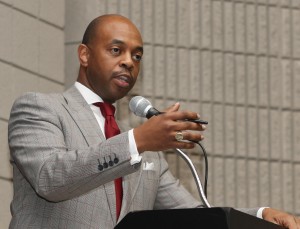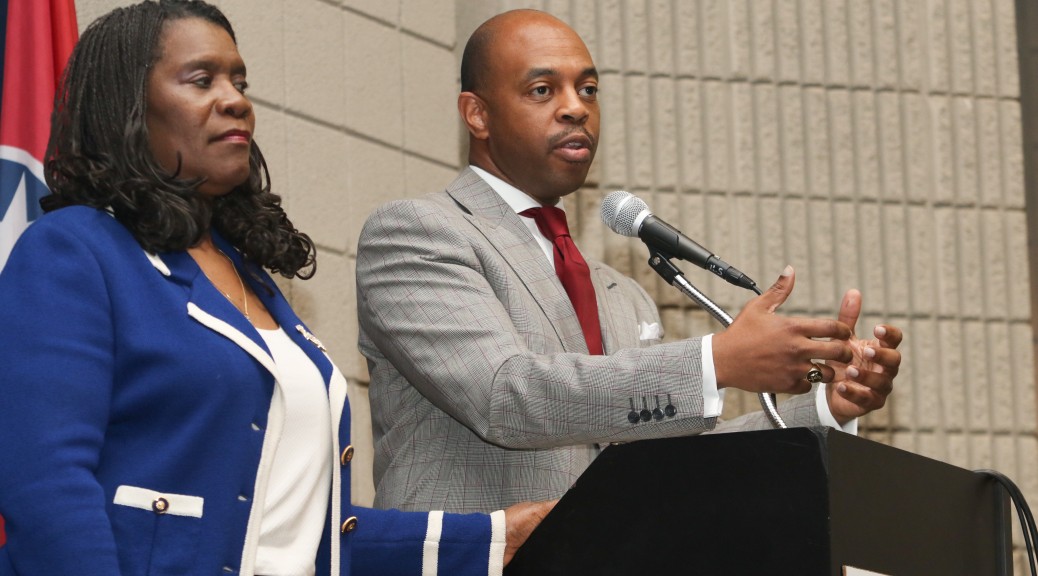NASHVILLE, Tenn. (TSU News Service) – Tennessee State University President Glenda Glover and State Rep. Harold Love, Jr. held a forum at TSU to discuss a legislative proposal that would restructure higher education governance.

Students, faculty, administrators, and alumni packed the Floyd-Payne Student Center auditorium on the university’s campus on Feb. 23 to learn more about the Focus on College and University Success Act and express their concerns about the proposal being pushed by Gov. Bill Haslam and that’s advancing in the legislative process.
Love, who represents the university in House District 58 and is also an alumnus of TSU, said he wanted to address concerns about the impact the legislation could have specifically on Tennessee State University.
“I felt it was important to make myself available to answer questions,” Love said before the event. “Tennessee State University has great leadership, students, faculty and alumni and it is my intention to convey their concerns to my colleagues in the Legislature and the Governor’s office.”
Currently, the Tennessee Board of Regents oversees 46 institutions: six public four-year state universities (including TSU), 13 community colleges and 27 technical colleges.
Under the FOCUS Act, TBR would oversee the state’s community and technical colleges only, and focus on promoting graduation rates at those institutions. Haslam has said the legislation is the next step in his “Drive to 55” initiative, which seeks to increase the percentage of Tennesseans with a postsecondary credential to 55 by 2025.
“With 46 institutions, it is difficult for TBR to meet all of the diverse challenges of the system,” according to the governor’s website about the legislation. “Community colleges arguably need greater focus at a system level in the Drive to 55, while TBR’s four-year state universities could benefit from greater autonomy.”
Glover said she has concerns about the legislation, but noted that of the nine amendments the university has proposed to the governor, four have been accepted.
She said one of her main concerns is that the legislation maintains an equitable funding process for all of the four-year public institutions, especially TSU.
“We have a mission that is far different from the other five institutions,” Glover said. “The proposed legislation can’t be viewed as one size fits all. This difference must be recognized. I have communicated these and other concerns to the governor’s office and they are working with us. I remain hopeful that the final legislation will be fair and equitable for our students, faculty, and staff, but most important, our university. We’re going to get through this together.”
Glover said she would be persistent in talking to lawmakers about what’s in the best interest of the university.
“Our university is in the planning stages of implementing FOCUS. We will host several meetings in an effort to keep the TSU family updated on any amendments to the bill as well as where we are in the implementation phase.”

Another concern is the bill’s makeup of local boards that will oversee the state’s six four-year institutions. Some attending the forum questioned whether the eight members appointed by the governor for the 10-member panels should be handling certain higher education issues, such as schools’ leadership, tuition, faculty tenure, and curricula.
“This bill appears to weaken the institutional leadership of the university and potentially allow a university board to manage the day-to-day operations whereby their credentials and vision may conflict with that of the president of the university, “ said Dr. Samuel Hargrove, dean of TSU’s College of Engineering. “However, if this is the intent of the bill, I am confident TSU will respond strategically to continue its mission and purpose.”
Faculty Senate Chair Michael Catanzaro said he’s received phone calls and emails from the Faculty Senate regarding concerns about the bill and its potentially negative impact on the university.
“Each college and school within Tennessee State University has specific curricula and requirements for diplomas and degrees as determined by accrediting agencies,” Catanzaro said. “The FOCUS bill enables a Board of Trustees that may comprise people with little or no knowledge of accreditation requirements to have the power to develop curricula that may adversely affect the quality of education as well as violate the ‘academic freedom’ of professors.”
Students also voiced their concerns about the proposal, with questions ranging from a name change, available funding for campus improvements, to student involvement on the newly formed university board.
SGA President RaCia Poston said she had spoken with her counterparts regarding student participation with the board on student-related programs, fees, and activities.
“I’ve talked with student leaders from the other TBR four-year institutions and shared my concerns about the student representative being a non-voting member of the board,” Poston said.
“As a legislative intern, I’m lobbying lawmakers during my time at the Capitol on why the student vote should count.”
Love urged everyone to email the governor and lawmakers their concerns, as well as attend legislative committee meetings where the bill is being debated. If the measure passes, it is expected to be fully implemented late next year.
Tennessee State University is the only four-year public institution in Nashville and the only public four-year HBCU in the State of Tennessee. TSU offers 45 bachelor’s degree programs and 24 master’s degree programs and awards doctoral degrees in biological sciences, computer information systems, engineering, psychology, public administration, curriculum and instruction, educational administration and supervision, and physical therapy. In entirety, Tennessee State University comprises eight colleges and schools.
Department of Media Relations
Tennessee State University
3500 John Merritt Boulevard
Nashville, Tennessee 37209
615.963.5331
About Tennessee State University
With more than 9,000 students, Tennessee State University is Nashville’s only public university, and is a comprehensive, urban, co-educational, land-grant university offering 38 undergraduate, 22 graduate and seven doctoral programs. TSU has earned a top 20 ranking for Historically Black Colleges and Universities according to U.S. News and World Report, and rated as one of the top universities in the country by Washington Monthly for social mobility, research and community service. Founded in 1912, Tennessee State University celebrated 100 years in Nashville during 2012. Visit the University online at tnstate.edu.
